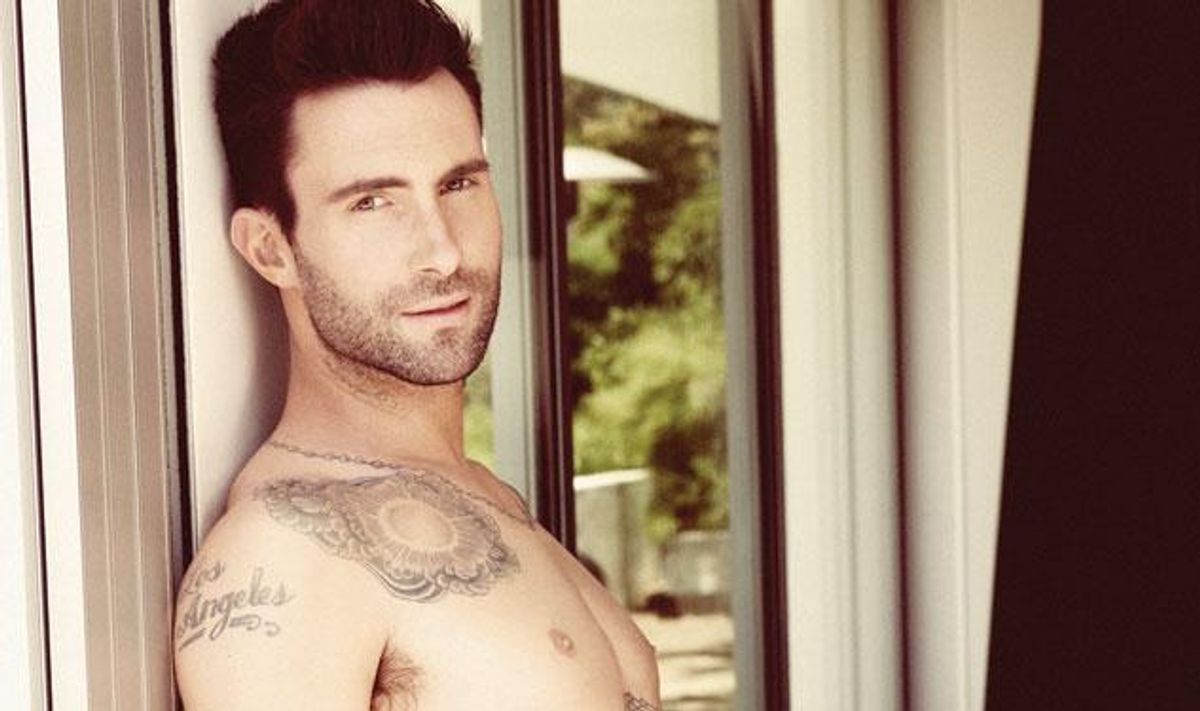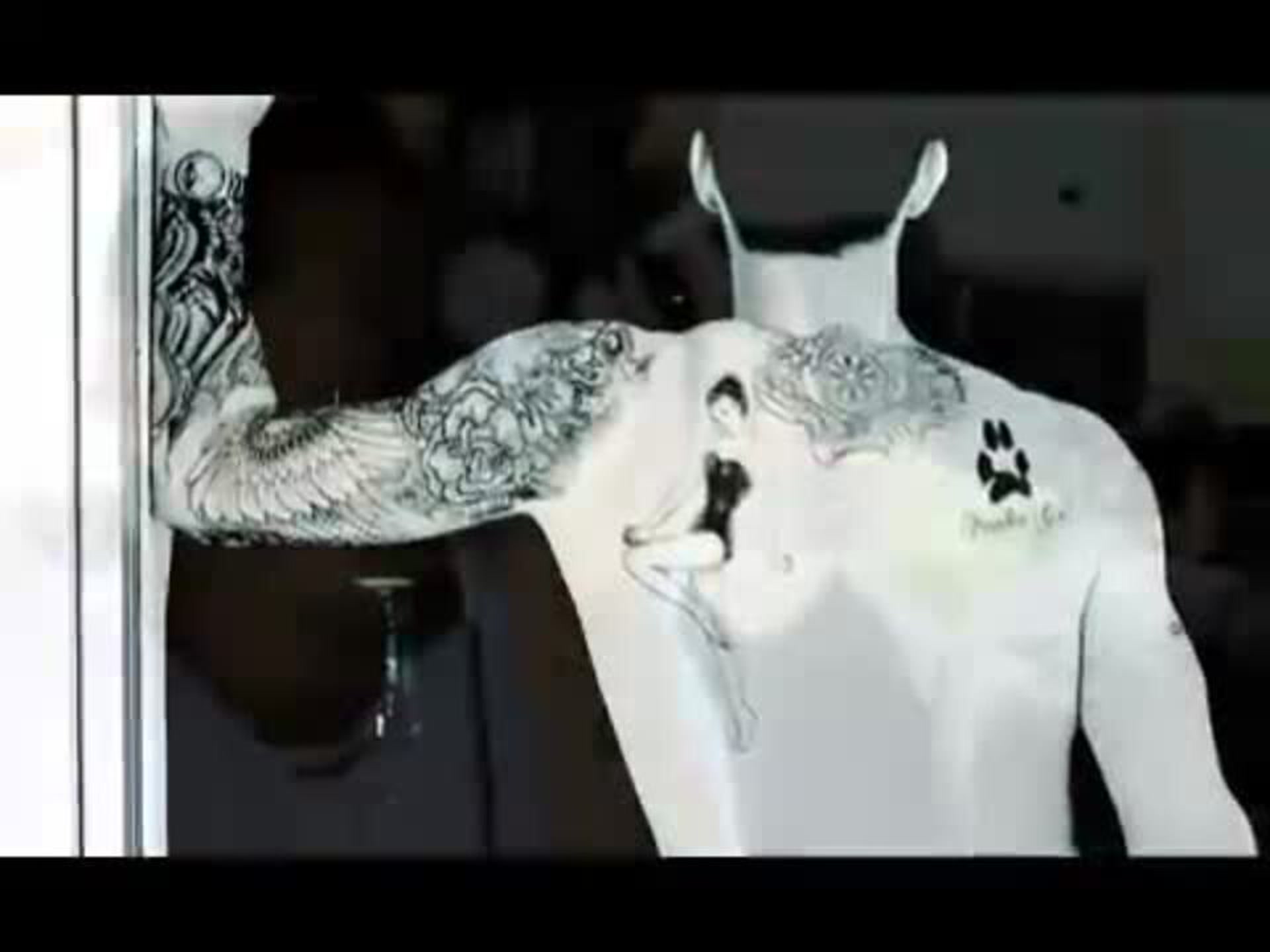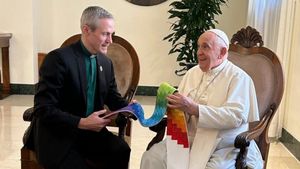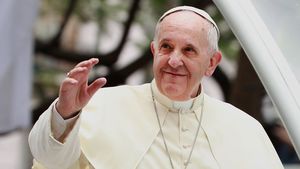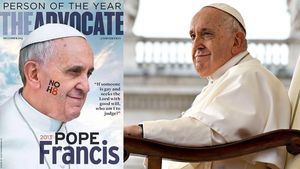Photography by Yu Tsai | Styling by Grant Woolhead
In concert, Adam Levine slinks across the stage with a seductive, easy confidence. He is, in a word, cocksure. There's a calculated tease, a sly wink across a room big enough to hold a small town. When the front man for Maroon 5 sings that he's "got the moves like Jagger," it's a ballsy boast, but not entirely out of line.
On The Voice, where he is one of four celebrity judges, Levine is confined to a high-backed throne that he spins around to indicate his belief that an unseen voice -- the voice, perhaps -- might be the one to win $100,000 and a recording contract. The Voice is more complicated than American Idol -- but also more fun, more diverse, and, because its celebrity coaches are on the hook to produce real talent, ultimately more satisfying to watch.
Stuck in that glorified swivel chair, watching the singers on his team compete, Levine wraps his tattooed arms -- a crouching tiger; a classic shout-out to mom; the number 222, a reference to his band's first recording studio -- around the seat's built-in table, pounding his fists with excitement that one of his prodigies has just nailed it. During the finale, he can barely contain himself while praising Javier Colon, the vocalist from Team Adam who ultimately wins. "Everyone knows you're an amazing singer, but what they may not know is that you're such an amazing guy," he says. "I've grown so close to you as a friend, and I've got so much love for you. And it's really hard for me to root for someone that I don't genuinely--" He chokes up. Clearing his throat, he tries again: "That I don't genuinely love very much."
Colon may have won the grand prize, but it's Levine who became The Voice's big breakout star. The show set records for its social media tie-ins, and many of the viewers who flooded Twitter with their commentary seemed to have little knowledge of Levine's previous life, beyond a vague recollection of Maroon 5's radio mainstays like "This Love," "She Will Be Loved," and "Makes Me Wonder."
To view our Adam Levine slide show, click here.
Levine's self-assured, heart-on-his-sleeve rocker style translated well to the small screen, even if he was skeptical about signing up. "As a musician, being on a television show can often read as This person needed to do this for their career -- which clearly was not the case for any of us."
With only three full-length studio albums in a decade, Maroon 5 is really more of a descendant of nomadic jam bands--since their 2002 debut, Songs About Jane, they've played hundreds of shows -- with a funkadelic, souped-up sound that relies as much on R&B hooks and hip-hop beats as extended guitar solos. They've sold more than 15 million albums and racked up three Grammys (including 2005's Best New Artist some 10 years after they first began playing together).
At times in the last few years, Levine has sounded ambivalent about committing to a long-term future as a front man of a globe-trotting band. But The Voice has obviously touched him deeply, rekindling his passion for performing and bringing to the forefront his crunchy, hippie attitude. He earnestly talks about the "energy" of the show and how "beautiful" it is that people have embraced music more than ever.
"I talk about it in a very heavy way, but it's definitely had a pretty profound impact on my life," he says. "That show's become a part of me. Being in a position where you can help these people out and -- of course I get paid, and of course it's good for my career as well. But there's a lot of real talent, and it makes me excited to know I'm part of that."
Still wiping sleep out of his eyes at a lunchtime interview at his sleek, modest home on the edge of Los Angeles' Griffith Park, Levine folds himself into the corner of a long purple couch and eats a bowl of Cracklin' Oat Bran. "The band has come to a point where we can just do everything the way we've done it, and that would probably be OK," he says, "or we could take a couple of risks." Risk No. 1: canceling a European tour so Levine could tape The Voice. Risk No. 2: releasing a summer single, the dancy disco-rock "Moves Like Jagger," featuring Aguilera, which hit number 1 on iTunes. "It's a bold statement," he says. "Do I think Mick Jagger is hot? I wouldn't say that personally. But he had something that was uniquely his own and that people gravitated towards."
Levine has a high, nimble voice and a light, loose-limbed step, but other than a brief kilt-wearing, John Mayer-kissing phase (they go way back -- Mayer took Maroon 5 on one of their first big tours), he's hardly the queerest performer in mainstream music today. "There's no way to hide my straightness," he says, "but if people didn't think there was a small chance I was gay, then I wouldn't be doing my job very well. Look at the best ones, guys whose sexuality was always questioned. Bowie. Jagger. Freddie Mercury. I wouldn't be the front man of a band if that question hadn't come up at some point."
A happily self-identified exhibitionist -- see his all-but-nude ad for testicular cancer awareness, or almost any of the band's videos, especially the one for "Never Gonna Leave This Bed," featuring Levine and his model girlfriend, Anne Vyalitsyna, rolling around in a Plexiglass-walled truck -- he could teach a very casual, very California course on human sexuality:
1. "I just love being as naked as possible all the time -- it feels really natural to me."
2. "I'm extremely comfortable in my sexuality, so I can think, Oh, that's a good-looking dude. Acknowledging that someone's attractive and wanting to fuck a dude are two different things."
3. "With a lot of guys who are hypersexual, it comes from some sort of disdain or dislike -- they're guys who love getting laid but don't really respect women. That doesn't mean that I haven't been totally promiscuous and slutty in my lifetime, because I have."
Levine, 32, grew up in a liberal Los Angeles home -- his parents both went to Berkeley -- but it wasn't his own sexuality that defined his open-minded beliefs. It was his younger brother's. "I can single-handedly dispel any ideas that sexuality is acquired," he says, laughing. "Trust me, you're born with it. My brother is gay, and we knew when he was two. We all knew."
Instead of a family freak-out, the Levines doubled down. "We all really wanted to provide some cushion for him and constantly let him know that it's OK," Levine says. "A lot of people don't want their kid to be gay and will fight it at all costs. But I've got news for you--it's a losing fucking battle. The more you fight it, the more fucked-up your kid's gonna be. You've just gotta embrace it from the beginning. That's the only way to deal with it as a family. Otherwise, you're just screwing yourself over, and you're gonna make your kid miserable."
Although he doesn't watch much TV, he was thrilled to see "Misery," the lead single off his band's most recent album, Hands All Over, used on Glee. It was sung by Kurt's boyfriend, Blaine (Out cover boy Darren Criss), in an episode that also featured Kurt and Blaine's first kiss. "It was just a cool moment," he says, "and I love Ryan [Murphy]. I'm glad he used the tune."
To view our Adam Levine slide show, click here.
The singer signed on early to the It Gets Better Project. "High school fucking sucked," he says in the clip, "but if you can get through it, there's a whole world that exists beyond people treating you badly." His participation was motivated as much by his own experiences with gossip. "Perez [Hilton] asked me to do it," he says. "I found it strange that one of the biggest bullies on Earth is asking me. I was really not a fan of his. I thought he was part of the problem. In doing this, I was hoping for a change in him, and I saw one. The guy has changed his tune quite a bit. I respect that."
It's typical of Levine to find the silver lining in any situation. "I'm realistic about the world, but I do have a very sunny perspective on things," he says. "When the 'F word' and the 'N word' are equally taboo, when you can't just walk around saying that word -- which you can, to be brutally honest -- that'll be when it's really real. Homophobia and racism are very different and have a very different history behind them. But for some reason, we're a little bit behind with homosexuality. The fact that gay marriage isn't legal everywhere at this point is a joke. But there are things now that you never thought would have existed, so I think that we're kind of in good shape."
The Voice is one of a new wave of music competition shows, all of which have set their sights on the aging elephant in the room. (The X-Factor, with Simon Cowell and Paula Abdul, was considered the real threat before The Voice debuted.) "I can't fuck with American Idol," Levine says. "It's a cultural institution. On The Voice, we just care about a different list of things. It's for a different type of person, I guess."
On the show, there were four openly gay contenders, two of whom -- Beverly McClellan and Vicci Martinez -- made it all the way to the finale and were championed by Levine, even though they were not on his team. And while the televised auditions may have been blind, with coaches' backs to the singers -- "It's impossible to tell who anybody is... I even thought [a male vocalist] was a girl" -- the original casting and accompanying back-story segments with host Carson Daly were matter-of-factly inclusive.
Levine is less diplomatic about this particular difference. "What's always pissed me off about Idol is wanting to mask that, for that to go unspoken. C'mon. You can't be publicly gay? At this point? On a singing competition? Give me a break. You can't hide basic components of these people's lives. The fact that The Voice didn't have any qualms about being completely open about it is a great thing."
He acknowledges that the music industry may still have a double standard for gay artists but says The Voice can help correct that. "It's a great show because it doesn't alienate anybody. If you're a talented person, and you want a career, and you're trying to join an extremely intimidating and also completely dismantled industry -- skip all that other bullshit, and go for what can be immediately effective."
Until The Voice starts taping again this fall, with a second season debut set for February, Levine is back on the road with Maroon 5, including make-up dates in Europe and a sold-out night at the Hollywood Bowl. "Being from L.A., growing up here and going to the Bowl -- that was the biggest dream," he says. "Having a strange second wind in our career has been pretty inspiring." And challenging. "Doing the show has made me realize my own shortcomings. It's made me want to improve upon them. Your personality is under the microscope. I've always had a slight chip on my shoulder about the fact that people might perceive me a certain way without really knowing my character. That maybe I was just kind of a bimbo. I wanted to show them, Hey, look, I can play. I've got a brain, and I'm not a total idiot. I wanted to set the record straight, I guess."
When not on the road, he's relatively settled down, even if it hasn't sunk in. "I still feel like a child -- look what I'm wearing." He's in pajama shorts and a white tank top. His golden retriever, Frankie, wanders in and out of the interview. "I feel like I wake up in the morning and I have this house, and I have this life, and I still feel like Tom Hanks when he woke up in Big." He and his girlfriend have been together almost two years, even though "musicians have relationships that are like dog years," he jokes, and a few months off the road leave him restless. "I twiddle my thumbs quite a bit," he says.
"I used to have a very set idea of what I wanted to accomplish -- I want to be like the Police, or I want to be like that guy. But when I turned 30, I thought to myself, My career's going to be its own thing, something that other people will aspire to, hopefully. I don't want to have anybody else's trajectory. It took a long time to figure it out, because anything less than being this person, as far as the way I'm perceived in the world, would have been unsatisfactory. Now I've kind of come into my own."
To view our Adam Levine slide show, click here.
